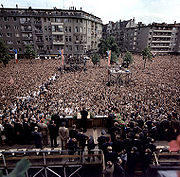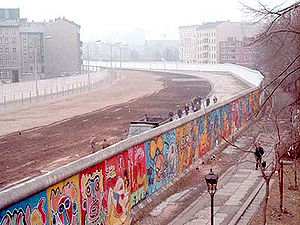Ich bin ein Berliner

"Ich bin ein Berliner" (translation: "I am a citizen of Berlin") is a quotation from a June 26, 1963 speech by U.S. President John F. Kennedy in West Berlin. He was underlining the support of the United States for West Germany 22 months after the Soviet-supported Communist state of East Germany erected the Berlin Wall as a barrier to prevent movement between East and West.
The speech is considered one of Kennedy's best, and a notable moment of the Cold War. It was a great morale boost for West Berliners, who lived in an exclave deep inside East Germany and feared a possible East German occupation. Speaking from a platform erected on the steps of Rathaus Schöneberg, Kennedy said,
Two thousand years ago the proudest boast was civis Romanus sum [I am a Roman citizen]. Today, in the world of freedom, the proudest boast is 'Ich bin ein Berliner!'... All free men, wherever they may live, are citizens of Berlin, and, therefore, as a free man, I take pride in the words 'Ich bin ein Berliner!'
Some reports claim that Kennedy came up with the phrase at the last moment, as well as the idea to say it in German. Kennedy asked his interpreter Robert H. Lochner to translate "I am a Berliner" only as they walked up the stairs at the Rathaus (City Hall). With Lochner's help, Kennedy practiced the phrase in the office of then-Mayor Willy Brandt, and in his own hand made a cue card with phonetic spelling. However, a U.S. Department of State language teacher wrote a 1997 account of visiting Kennedy at the White House weeks before the trip to help compose the speech and teach him the proper pronunciation.[1]
Kennedy's National Security Advisor McGeorge Bundy felt the speech had gone "a little too far", and the two revised the text for a softer stance before repeating the speech at the Free University later that day.[2]
This message of defiance was aimed as much at the Soviets as it was at Berliners, and was a clear statement of U.S. policy in the wake of the construction of the Berlin Wall. However, Kennedy was criticized for making a speech that acknowledged Berlin's status quo as reality. The official status of Berlin at the time was that it was under joint occupation by the four Allied powers, each with primary responsibility for a certain zone. Up to this point the U.S. had asserted that this was its status, even though the actual situation was far different. Kennedy's speech marked the first instance where the U.S. acknowledged that East Berlin was part of the Soviet bloc along with the rest of East Germany.
There are commemorative sites to Kennedy in Berlin, such as the German-American John F. Kennedy School and the John F. Kennedy Institute for North American Studies of the Free University of Berlin. Also, the public square in front of the Rathaus Schöneberg (where Kennedy made the famous speech, see image below) was renamed "John-F.-Kennedy-Platz". A large plaque dedicated to Kennedy is mounted on a column at the entrance of the building and the room above the entrance and overlooking the square is dedicated to Kennedy and his visit.
The original manuscript of the speech is stored with the National Archives and Records Administration.
Contents |
Background
| History of Berlin | |
|---|---|
 This article is part of a series |
|
| Weimar Republic (1919–33) | |
| 1920s Berlin | |
| Greater Berlin Act | |
| Nazi Germany (1933–45) | |
| Welthauptstadt Germania | |
| Bombing of Berlin in World War II | |
| Battle of Berlin | |
| Divided city (1945–90) | |
| East Berlin | |
| West Berlin | |
| Berlin Wall |
|
| Berlin Blockade (1948–49) | |
| Berlin Crisis of 1961 | |
| "Ich bin ein Berliner" (1963) | |
| "Tear Down This Wall" (1987) | |
| See also: | |
| History of Germany | |
| Margraviate of Brandenburg | |
|
|
Germany's capital, Berlin, was deep within the area controlled after World War II by the Soviet army. Initially governed in four sectors controlled by the United States, United Kingdom, France, and the USSR, tensions of the Cold War escalated until the Soviet forces implemented the Berlin Blockade, which the Western allies relieved with the dramatic airlift.

Afterward, the sectors controlled by the NATO Allies became an effective exclave of West Germany, completely surrounded by East Germany (West Berlin was not officially a part of the Federal Republic. All of Berlin remained officially occupied by the Allied Military powers until 3 October 1990). From 1952, the border between East and West was closed everywhere but Berlin. Hundreds of thousands of East Germans defected to the West via West Berlin, a labour drain that threatened East Germany with economic collapse.
In 1961 the East German government under Walter Ulbricht erected a barbed-wire barrier around West Berlin. It was officially called the antifaschistischer Schutzwall (anti-fascist protective barrier). The East German authorities argued that it was meant to prevent spies and agents of West Germany (which they considered a fascist state) from crossing into the East. However, it was universally known as the Berlin Wall and the majority opinion was that its primary purpose was to keep East German citizens from escaping to the West. Over a period of months the wall was rebuilt using concrete, and buildings were demolished to create a "death zone" in view of East German guards armed with machine guns. In 1962 the first attempted escape leading to a fatal shooting took the life of Peter Fechter.
The West, including the U.S., was accused of failing to respond forcefully to the erection of the Wall. On July 25, 1961, with the April Bay of Pigs fiasco still fresh, President Kennedy broadcast a Presidential address. Kennedy insisted that America would defend West Berlin, asserting its Four-Power rights, while making it clear that challenging the Soviet presence in Germany was not possible.
Jam doughnut

It is a common misconception that Kennedy made a humourous error by saying "Ich bin ein Berliner." According to this idea, Kennedy referred to himself not as a "citizen of Berlin", but as a "jam doughnut", which is known in parts of Germany as a "Berliner".[3]
Kennedy should have said "Ich bin Berliner" to mean "I am a person from Berlin." By adding the indefinite article ein his statement, supposedly, implied he was a non-human Berliner, thus "I am a jam doughnut".
The indefinite article ein is omitted when speaking of an individual's profession or residence but is necessary when speaking in a figurative sense as Kennedy did. Since the president was not literally from Berlin but only declaring his solidarity with its citizens, "Ich bin Berliner" would not have been correct.[4]
In 1988 William J. Miller wrote in an April 30 New York Times article:
It's worth recalling, again, President John F. Kennedy's use of a German phrase while standing before the Berlin Wall. It would be great, his wordsmiths thought, for him to declare himself a symbolic citizen of Berlin. Hence, Ich bin ein Berliner. What they did not know, but could easily have found out, was that such citizens never refer to themselves as "Berliners." They reserve that term for a favorite confection often munched at breakfast. So, while they understood and appreciated the sentiments behind the President's impassioned declaration, the residents tittered among themselves when he exclaimed, literally, "I am a jelly-filled doughnut."[5]
Some German commentators suggest that the citizens of Berlin do refer to themselves as Berliner; what they do not refer to as Berliner are jelly doughnuts. While these are known as Berliner Pfannkuchen (literally meaning "Berlin Pancake(s)"), commonly shortened to Berliner, in other areas of Germany, they are simply called Pfannkuchen (pancakes) in and around Berlin.[6] According the German History Museum the theoretical ambiguity went unnoticed by Kennedy's audience.[7] The term has since been repeated by media such as the publisher of the Morning Call, Tim Kennedy, and the BBC (by Alistair Cooke in his Letter from America program),[8] The Guardian,[9] MSNBC,[10] CNN,[11] Time magazine,[12] The New York Times,[13] in several books about Germany written by English-speaking authors, including Norman Davies[14] and Kenneth C. Davis,[15] and it is even mentioned in a stand-up show by Eddie Izzard, as well in the Speech Synthesis Markup Language specification.[16]
As for the creation of the speech, it had been reviewed by journalist Robert Lochner, who was educated in Germany, and had been practiced several times in front of numerous Germans, including Berlin Mayor Willy Brandt. The many video and audio recordings of the event show only enthusiastic applause following the statement; the only laughter occurred later, when Kennedy jokingly thanked his translator for his translation of Kennedy's German sentence into German.

During the speech Kennedy used the phrase twice, ending his speech on it. However, Kennedy did pronounce the sentence with his Boston accent, reading from his note "ish bin ein Bearleener," which he had written out in English phonetics.
References in popular culture
The phrase and the legend are quoted very often in fiction and popular culture in the United States. Besides a direct quote there exist many variations starting "Ich bin ein (+ noun, e.g., Frankfurter)" that is supposed to be understood by the primarily English-speaking audience based on the widespread knowledge of this German phrase and its myth. This verbal template, or snowclone, has arisen in a variety of rhetorical contexts in popular culture.
Further reading
- Daum, Andreas W. (2007). Kennedy in Berlin. Cambridge University Press. ISBN 978-0521858243.
References
- ↑ AmericanHeritage.com
- ↑ Robert Lochner. "Teaching JFK German". CNN.com. http://www.cnn.com/SPECIALS/cold.war/episodes/09/reflections/. Retrieved 2006-09-24.
- ↑ Ich bin ein Pfannkuchen. Oder ein Berliner? | Stadtkind: Berlin
- ↑ Eichhoff, Jürgen (1993). "'Ich bin ein Berliner': A History and Linguistic Clarification". Monatshefte für den deutschen Unterricht, deutsche Sprache und Kultur (Monatshefte.org, University of Wisconsin Press) 85 (1): 71–80. ISSN 0026-9271, cited in Erb, Scott (2003). German Foreign Policy: Navigating a New Era. Boulder, CO: Lynne Rienner. pp. 52. ISBN 1588261689. http://books.google.com/?id=yb2vMKlTnGEC&pg=PA52&vq=eichhoff&dq=%22German+Foreign+Policy:+Navigating+a+New+Era%22.
- ↑ Miller, William J (April 30, 1988). "'I Am a Jelly-Filled Doughnut'". The New York Times. http://query.nytimes.com/gst/fullpage.html?res=940DEEDF1439F933A05757C0A96E948260. Retrieved 2008-07-05.
- ↑ Wie heißt der Berliner in Berlin?
- ↑ John F. Kennedy
- ↑ BBC NEWS | Programmes | Letter From America | "I am a jelly doughnut"
- ↑ Richard Hollis: "How we got the measure of a Berliner", The Guardian, September 10, 2005
- ↑ Onegoodmove.org "Bloopers"
- ↑ CNN - Cold War
- ↑ Wall-To-Wall Kennedy - TIME
- ↑ Profile in Courage
- ↑ Norman Davies, Europe: A History, New York 1998, p. 1113
- ↑ Davis, Kenneth C. (2007). Don't Know Much about Anything: Everything You Need to Know But Never Learned about People, Places, Events, and More!. HarperCollins. ISBN 978-0061251467.
- ↑ W3.org
External links
|
|||||||||||||||||||||||||||||||
